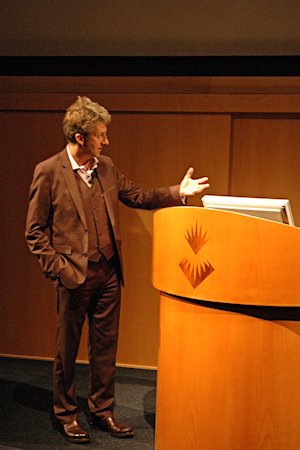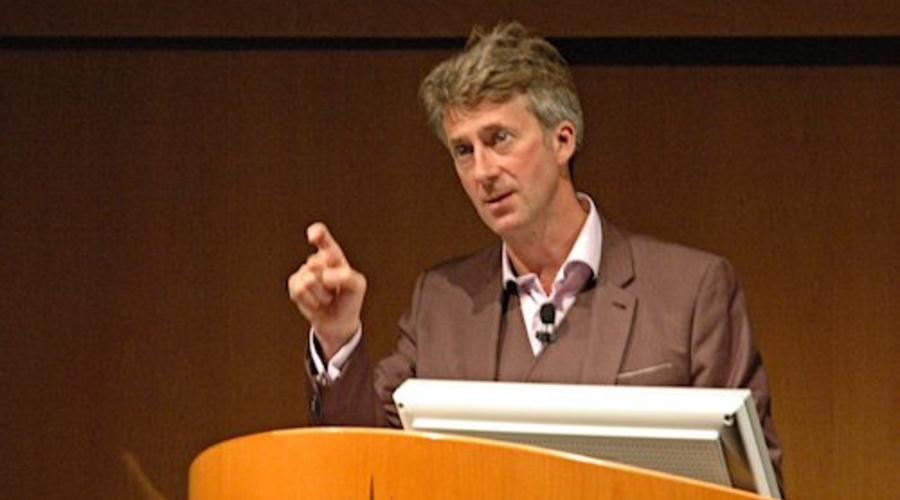RTS North East & The Border Keynote Lecture, May 2010, with Peter Salmon
A revolution in the creative landscape, shifting the gravity of UK broadcasting, is the mission of BBC North Director Peter Salmon, who presented the Annual Keynote Lecture for RTS North East and the Borders.
And he said he wanted it to be the BBC who talent spot the next Ant and Decs, Cheryl Coles and Vic and Bobs W rather than ITV and Channel 4 which have previously had the better connection with regions and audiences.
Although there is still a year to go until his five departments are based at Salford's MediaCity, Peter predicted this change will "leave BBC audiences W wherever they live W enjoying more programmes that reflect the unique identity of the places in which they are forged, but at the same time speak beyond the local, with voices that are recognisably regional and also universal.
"That didn't stop American hit The Wire W rooted very firmly in Baltimore W did it?"
A commissioning and production budget of up to £500m will help, and the audience of more than a hundred at Sunderland University's Tom Cowie Lecture Hall was keen to hear how likely it was that the whole North will play a part in this bright new future.
Steps already taken include developing interactive Dr Who episodes with Sumo of Sheffield; working with 50 independent companies in the @North initiative to make online children's content; BBC 4's The Great Northern series this autumn; the recommissioning of Tracy Beaker in Newcastle; BBC 3's year-long medical documentary; and Five Live is to mark the 30th anniversary of the Great North Run, the world's biggest half marathon.
Talent development is another piece of the jigsaw in broadening the range of voices across BBC output. It was ITV which touched a North East soft spot by throwing a spotlight on South Shields' Joe McElderry.
Kim Inglis chairs the Q&A session
In the following Q&A session, Garth Jeffery, RTS Centre Vice Chairman, asked how the bedrock skills base can be maintained, especially now the BBC has ended its long running drama Byker Grove. Peter agreed it is a "deep rebuilding process". Tracy Beaker is the "first step in a long journey". Another example is the North East Comedy Initiative, developed with Northern Film and Media as a cross platform scheme with BBC Future Media and Technology to develop talent from writers, stand-ups, film makers or animators.
Earlier this year, the BBC held its Connect and Create Conference for the whole North at Teesside University. One Sunderland student W Amber Bulloch W impressed the BBC Director General and others, and she has been offered a placement with the development team in Entertainment. Fifteen Sunderland students went to Manchester for a special World Cup day of workshops around sports coverage, and two Sunderland students have won placements during the World Cup itself W Nadia Haif is going to the Sports News Team and Kevin Moeliker will be based at Radio Sport on 5 Live.
Said Peter: "Of course it is not just about young and up coming talent. We need to make it as easy as possible to find and engage talent from all walks of life. We need many new skills to change the BBC's DNA. It is about enthusiasm and passion and energy W and you can have that if you are 18 or 58!"
Investment in local economies is as important as investing in talent. "The licence fee itself has a role as creative capital pump primer W and research by Deloitte's earlier this year showed that every pound of licence fee spend generated at least two pounds of economic value. Again, so important in these straitened times."
An example of this economic benefit was illustrated by BBC Sports Personality of the Year in Sheffield. "Cynics told us the stars wouldn't come and the show would decline. What rubbish. On the contrary, the likes of Jensen Button, Ryan Giggs, Fabio Capello, Dame Kelly Holmes and Sir Chris Hoy were all there, and Sheffield was delighted because it gave something like a million pound boost to the local economy and acted as a shop window for the City's growing confidence and ambition."
Tony Edwards, RTS Centre Secretary, queried whether these signs of progress would continue longer term W especially with a change of government and huge cutbacks looming in public expenditure.
"Moving five additional departments from London to Greater Manchester is not an empty political gesture on the part of the BBC. It is structural and sustainable change which can stimulate generations of new talent and create hundreds of new opportunities for people already living in the North.

"I really believe what is happening will make a long term difference. It is not an initiative. It is structural... and permanent.
"It will be part of my job to make sure that it starts to touch lives across the whole of the region."
"It doesn't stop at Manchester. It starts there. The project's arteries must feed into all corners of the greater north, invigorating the creative industries throughout the region, and channelling new blood back into our output as a whole W or we will fail"
By Olwyn Hocking
To read the full text of Peter Salmon's presentation, click here

